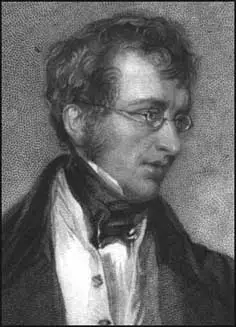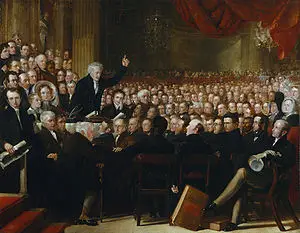
Thomas m. Hannah Gurney (1783-1872)
Lloyd H Fox was the half 2nd cousin 3x removed of Thomas Buxton
Griselda Bigland was the 1st cousin 3x removed of Hannah Gurney
source: wikipedia
Sir Thomas Fowell Buxton, 1st Baronet (1 April 1786[1] – 19 February 1845) was an English Member of Parliament, brewer, abolitionist and social reformer.
Buxton was born at Castle Hedingham, Essex. His father was also named Thomas Fowell Buxton. His mother’s maiden name was Anna Hanbury. Through the influence of his mother, who was a Quaker, Buxton became a close friend of Joseph John Gurney and his sister Elizabeth Fry, who were both prominent Quakers. Buxton married their sister Hannah Gurney, of Earlham Hall, Norwich in May 1807. He lived at Northrepps Hall in Norfolk.
Early life
In 1808, Buxton’s Hanbury family connections led to an appointment to work at the brewery of Truman, Hanbury & Company, in Brick Lane,Spitalfields, London. In 1811 he was made a partner in the business, renamed Truman, Hanbury, Buxton & Co. Later he became sole owner.
Although he was a member of the Church of England, Buxton attended Friends meetings with members of the Gurneys and became involved in the social reform movement, in which Friends were prominent. He helped raise money for the weavers of London, who were being forced into poverty by the factory system. He provided financial support for Elizabeth Fry’s prison reform work and joined her Association for the Improvement of the Female Prisoners in Newgate.
Buxton was elected to Parliament for Weymouth and Melcombe Regis in 1818. As an MP he worked for changes in prison conditions and criminal law and for the abolition of slavery, in which he was helped by his sister-in-law Louisa Gurney Hoare. He also opposed capital punishment and pushed for its abolition. Although he never accomplished this last goal during his lifetime, he worked to restrict those crimes for which capital punishment was sentenced; the number of crimes punishable by death was reduced from more than 200 to eight.
Thomas and Hannah Buxton had eight children. Four of them died of whooping cough over a five-week period around April 1820. Another one died of consumption some time later.
Abolitionism
Buxton is on the left edge in this painting which is of the 1840 World Anti-Slavery Convention.
The slave trade had been abolished in 1807, but Buxton began to work for the abolition of the institution of slavery. In 1823 he helped found the Society for the Mitigation and Gradual Abolition of Slavery (later known as the Anti-Slavery Society). In the House of Commons in May 1823,

Buxton introduced a resolution condemning the state of slavery as “repugnant to the principles of the British constitution and of the Christian religion”, and called for its gradual abolition “throughout the British colonies”. He also pressured the government to send dispatches to the colonies to improve the treatment of slaves. Buxton took over as leader of the abolition movement in the British House of Commons after William Wilberforce retired in 1825.
He achieved his goal in 1833, when slavery was officially abolished in the British Empire, except in India, where it was part of the indigenous culture. Buxton held his seat in Parliament until 1837
In 1839 Buxton urged the British government to make treaties with African leaders to abolish the slave trade. The government in turn backed the Niger expedition of 1841 (not including Buxton) put together by missionary organizations, which was also going to work on trade. More than 150 people were part of the expedition, which reached the Niger Delta and began negotiations. The British suffered such high mortality from fevers, with more than 25% of the group dying rapidly, that they cut short the mission in 1841.
David Livingstone was strongly influenced by Buxton’s arguments that the African slave trade might be destroyed through the influence of “legitimate trade” (in goods) and the spread of Christianity. He became a missionary in Africa and fought the slave trade all his life.
In 1840 Buxton was created a baronet. His health failed gradually – according to some, due to disappointment over the failed mission to Africa. He died five years later.
Founding chairman of RSPCA
On 16 June 1824 a meeting was held at Old Slaughter’s Coffee House, St. Martin’s Lane, London that created the Society for the Prevention of Cruelty to Animals. (It became the RSPCA when Queen Victoria gave royal assent in 1840.) The 22 founding members included William Wilberforce, Richard Martin, Sir James Mackintosh, Basil Montagu, and Rev. Arthur Broome. Buxton was appointed chairman for the year 1824.
Legacy and honors
A plaque is dedicated to him in Norwich Cathedral.
A monument to him stands in Westminster Abbey.
A memorial to the emancipation of slaves, dedicated to Buxton, was installed in Victoria Tower Gardens.
Commissioned by his son Charles Buxton MP, the Buxton Memorial Fountain was designed by Samuel Sanders Teulon and installed in Parliament Square. In 1940 it was removed during the German bombings of London in World War II. It was installed at its present location in 1957.
Also named after Sir Buxton is Fowell Close in Earlham, Norwich.
In the 21st century, a representation of Buxton is printed on the current English five-pound note. He is the figure wearing glasses in the group on the left-hand side of Elizabeth Fry.
In February 2007 a memorial plaque in his honor was installed at the Norwich Friends Meeting House in Upper Goat Lane.
In Weymouth, Dorset, which he served for 19 years as MP, the main route to the Isle of Portland is named Buxton Road. It runs past Bellfield Park, his former home in Wyke Regis. There are plans in Weymouth to erect a permanent memorial to him.
Descendants[edit]
Buxton had a number of notable descendants:
Sir Edward North Buxton, 2nd Baronet (1812–1858): married Catherine Gurney
Sir Thomas Fowell Buxton, 3rd Baronet (1837–1915): married Lady Victoria Noel
Sir Thomas Fowell Victor Buxton, 4th Baronet (1865–1919)
Noel Edward Noel-Buxton, 1st Baron Noel-Buxton (1869–1948)
Charles Roden Buxton (1875–1942)
Harold Jocelyn Buxton (1880–?)
Leland William Wilberforce Buxton (1884–1967)
Samuel Gurney Buxton (1838–February 1909)
Edward North Buxton (1840–1924)
Henry Edmund Buxton (1844–1905)
Charles Louis Buxton (1846–1906)
Francis William Buxton (1847–1911)
Thomas Fowell Buxton (1822–1908): Married Rachel Gurney
Elizabeth Ellen Buxton (later Barclay) (1848–1919)
John Henry Buxton (1849–1934): director of Truman, Hanbury, Buxton Brewery, chairman of the London Hospital
Geoffrey Fowell Buxton (1852–1929): director of Barclays Bank
Alfred Fowell Buxton (1854–1952): chairman of London County Council
Barclay Fowell Buxton (1860–1946): missionary
Murray Barclay Buxton (1889–1940)
Alfred Barclay Buxton (1891–1940)
George Barclay Buxton (1892–1917)
Barclay Godfrey Buxton (1895–1986)
Charles Buxton (1823–1871): married Emily Mary Holland
Bertram Henry Buxton (1852–1934)
Sydney Buxton, 1st Earl Buxton (1853–1934)